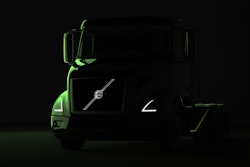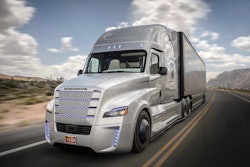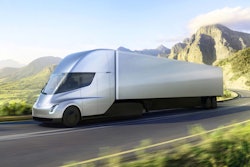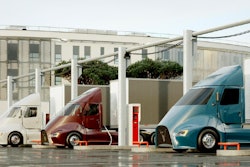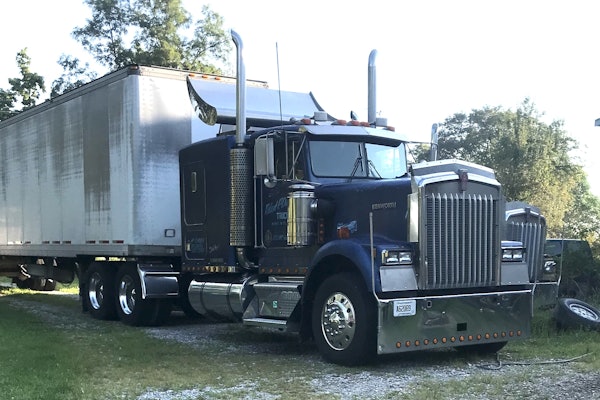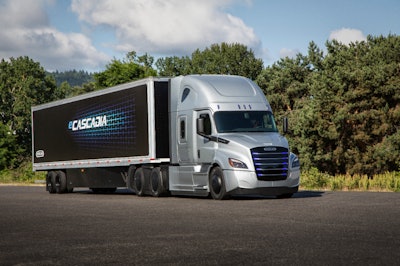 The Freightliner eCascadia is slated to enter production by 2021.
The Freightliner eCascadia is slated to enter production by 2021.Freightliner Trucks this week introduced two fully electric trucks, including an electric version of its flagship Cascadia tractor. The Freightliner eCascadia is designed for local and regional operations, the company says, and will have a roughly 250-mile range. The eCascadia will enter production “sometime in the next two to three years,” said Daimler Trucks North America President Roger Nielsen.
Freightliner introduced the truck Wednesday at the Daimler Trucks Capital Market and Technology Day in Portland, Ore.
The eCascadia features up to 730 peak horsepower. Its batteries provide 550 kilowatt hours (kWh) of usable capacity, which translates to a range of up to 250 miles with the ability to charge up to 80 percent – providing a range of 200 miles – in about 90 minutes.
The smaller eM2 features up to 480 peak horsepower. The batteries provide 325 kWh of usable capacity, giving it a range of up to 230 miles. A 60-minute charge will get the batteries up to about an 80 percent charge and deliver a range of 184 miles. The eM2 targets local distribution, pickup and delivery, food and beverage delivery and final-mile logistics applications.
“It’s easy to find use cases for the eM2 today,” Daimler Trucks North America President Roger Nielsen says. “We expect high customer demand for this truck when we make it available for series production sometime in the next two to three years.”

Nielsen says both the eCascadia and eM2 are designed for dedicated, predictable routes where most daily runs fall between 45 and 150 miles.
“Payload can be a compromise to guys hauling steel coils over the Rocky Mountains,” he says.
The Freightliner eCascadia, with 80,000 lb. gross combined weight rating (GCWR), and the 26,000 lb. GCWR eM2 are part of Daimler Trucks’ global electrified truck initiative, joining the Mercedes-Benz eActros and the eFuso Vision One.
Neilson acknowledged that e-mobility is still fraught with challenges that include a weak charging infrastructure and service network. DTNA parent Daimler AG is a founding member of the Charging Interface Initiative (CharIN) – an effort to develop a standard charging system for battery-powered vehicles. DTNA is also heading a CharIN taskforce to develop a new electric commercial vehicle charging standard globally, collaborating with utilities and service providers to foster a supportive environment for high-voltage charging networks and serve as a trusted consultant for customers.
“We are all-in for tackling the electrification challenge for North America,” Neilson says. “Our path to e-Mobility is designed to set the tone for the next generation of environmentally friendly propulsion systems now and for our future … Without an infrastructure to support and charge these vehicles, there will be no eTrucks on the road. We have the responsibility to give our customers support on the infrastructure side.”
The eCascadia and eM2 are both slated for production in 2021. In the interim, Freightliner plans to deliver an Electric Innovation Fleet of 30 vehicles to select customers later this year for testing under real-world conditions.
